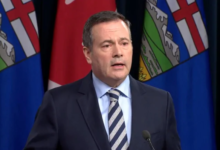Alberta on track to begin reopening in May, Premier Jason Kenney says
Though final decisions have yet to be made, Alberta is on track to begin reopening some aspects of the economy in May, says Premier Jason Kenney.
The province plans to release more information about a staged relaunch later this week, including target dates, Kenney said Tuesday at a news conference.
“Some of this we’re going to have to make final decisions as we get closer to them, based on how well we do,” Kenney said. “Hopefully we’ve contained recent outbreaks. We’re going to have to monitor those very closely, monitor the other key points of data.
“But I do hope that we will be able to begin reopening aspects of social and economic life that have currently been suspended in the month of May.”
The Alberta government released new modelling projections on Tuesday that estimate far fewer Albertans will require hospitalization and critical care when the coronavirus reaches its expected peak in the province in late May.
That new projection now thought to be the most likely scenario estimates that 298 people will be in hospital with 95 in ICU beds at the peak, if current trends continue.
On Tuesday, 82 people were in hospital with the illness, 21 of them in ICU beds.
“When we first presented the models three weeks ago, with a very steep peak in late May, it looked like we might not be able to begin reopening things until the month of June,” Kenney said. “I think it looks much more optimistic that we can begin doing so, in some respects, in a couple of weeks. We have not yet taken final decisions. Just wait for our announcement.”
Updated modelling
Updated data and modelling show that efforts to reduce the peak of the virus are working, Kenney said.
“While this is good news, we must, of course, remain vigilant. The health-care system continues to be able, very capably, to manage the impact of COVID-19. Albertans are doing their part by following public health orders, practising physical distancing and good hygiene, and staying home when possible.
“While we are a ways off from returning to our normal way of life, we are working as a government around the clock on our phased approach to relaunch.”
Other provinces have already released plans to reopen parts of their economies. Kenney said any relaunch in Alberta will be closely co-ordinated with neighbouring Saskatchewan and B.C.
He said the government and public health officials will be closely watching several measures including: the number of hospitalizations; the number of intensive care admissions; and the rate of growth of COVID-19 cases, including confirmed cases as a percentage of testing.
Exemptions for Fort McMurray floods
On Tuesday evening, Kenney announced via Twitter that people who are working in flood suppression and prevention in the Regional Municipality of Wood Buffalo would be exempt from some public health orders regarding physical distancing.
The exemption came from Hinshaw, and stated that the orders regarding gatherings of 15 or more people outside and maintaining a distance of two metres between people outside would not apply to residents involved in flood suppression and prevention. The order states that all other public health orders would still be in effect.
The order also mentions those people should wear personal protective equipment, if available. Kenney noted in his Twitter post that the province is sending masks to Fort McMurray.
Latest numbers
Alberta reported five more deaths from COVID-19 on Tuesday and 154 new cases.
The total number of deaths in Alberta has now reached 80, and the total number of cases is 4,850.
The premier said the updated modelling uses the most current Alberta data.
The updated “probable scenario” estimates 596 people will require hospitalization when the virus reaches its peak. That’s down from the previous projection of 818 people.
But Kenney also challenged the team working on the modelling to come up with a new “low scenario” he said would be closer to what Alberta is actually experiencing, rather than being based on assumptions largely drawn from other jurisdictions.
“If trends continue as they are,” he said, “this new low scenario could become the most likely scenario for Alberta, and let’s hope that’s the case. This likely new scenario suggests nearly 300 people will require hospitalization when the virus reaches its peak.”
Alberta is seeing lower hospitalization rates than other jurisdictions because it has the youngest population in the country and “the best testing program,” Kenney said.
“This high rate of testing means we have a higher proportion of confirmed cases with relatively weak symptoms that do not require acute or critical care in hospital. Additionally, younger populations often do not experience symptoms that are as severe as older people, and therefore are not as likely to require hospitalization.”
The regional breakdown of the cases was:
- Calgary zone: 3,366
- South zone: 685
- Edmonton zone: 486
- North zone: 202
- Central zone: 84
- Unknown: 27
Though Albertans may be tired of self-isolation and physical distancing, the province’s top doctors says the COVID-19 case numbers show the province is not yet in a place where restrictions can be lifted on a large scale.
Dr. Deena Hinshaw, the province’s Chief Medical Officer of Health, stressed that while the modelling forecast shared Tuesday is good news, the battle against the virus is far from over.
“Modelling is just a projection of a potential future,” Hinshaw said. “It is not a guarantee, and cases could easily spike in Alberta if we are not careful.
“I know that many Albertans are tired of the public health restrictions. Many of you are tired of hearing me say we are all in this together. Every single Albertan has been making sacrifices for many weeks, and every Albertan has been impacted by this pandemic.
“You have been making sacrifices every day to make sure that your loved ones, neighbours, co-workers and fellow citizens are safe. Today I am asking you to celebrate the success that we have had, by holding on just a little while longer. Our public health measures are working and we need to keep them working.”
CBC







Redes Sociais - Comentários